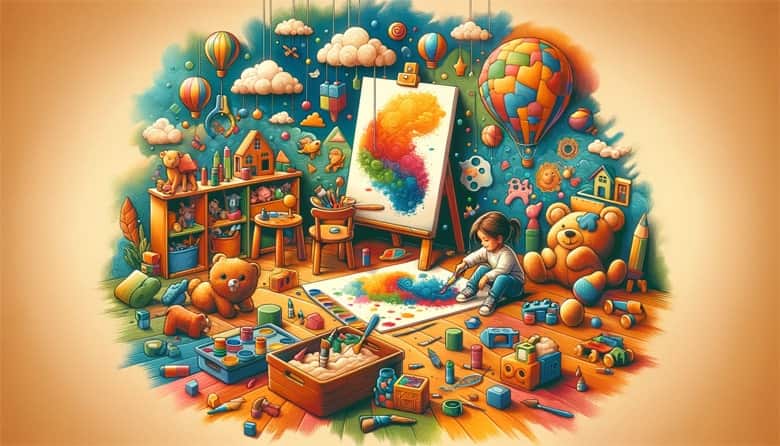Boosting Child Mental Health.
Welcome, parents! Let’s talk about a vital aspect of our children’s well-being: their mental health. Understanding and nurturing the mental health of our young ones is not just important; it’s essential. This is where play therapy for children comes into play – Pun intended!
TL;DR Key Takeaways
- Play therapy is a therapeutic approach using play to address psychological issues and enhance emotional and social development in children.
- It offers a safe environment for children to express themselves and develop coping mechanisms.
- The therapy includes techniques like symbolic play, creative arts, storytelling, and therapeutic games, each tailored to individual child’s needs.
- Parental involvement is crucial for enhancing the effectiveness of therapy.
- Combining play therapy with other mental health strategies can provide comprehensive care for children.
For more detailed information, visit AERCS Therapy.
Why Focus on Child Mental Health?
- Mental health is as crucial as physical health for children.
- Early attention to mental health can set the foundation for a healthy, happy adulthood.
What is Play Therapy?
- It’s a therapeutic approach that uses play to address psychological issues and enhance emotional and social development.
- Tailored specifically for children, it provides a safe and comfortable environment for them to express themselves.
Why is it Important?
- Children often communicate more freely in play than they do in conversation.
- Play therapy for children offers a non-threatening way to explore feelings and develop coping skills.
We’re going to dive into how play therapy for children can be a game-changer in boosting your child’s mental health. Ready to learn more? Let’s embark on this journey together, ensuring our children grow into emotionally healthy adults!
Understanding Play Therapy.
Let’s unpack what play therapy for children really is and how it can be a cornerstone in your child’s emotional and mental development.
What Exactly is Play Therapy?
- It’s a therapeutic technique where play is used as a medium for children to express feelings and confront complex emotional and social issues.
- Unlike regular play, it’s guided by a trained therapist to address specific psychological needs.
Core Components of Play Therapy
- Safe Environment: Creates a nurturing space where children feel comfortable to open up.
- Communication Through Play: Utilizes toys and games as tools for children to express themselves when words are hard to find.
- Child-Centered Approach: Tailored to each child’s individual needs, making therapy relevant and effective.
Why Play Therapy?
- Children often find it easier to express themselves through play than through direct conversation.
- It helps in developing coping mechanisms and emotional intelligence in a non-threatening way.
Remember, every child is unique, and play therapy for children caters to this uniqueness, making mental health care engaging and effective. For more details, check out the AERCS Therapy’s Play Therapy page.
The Importance of Play Therapy for Child Development
Parents, you might have seen the CBS Kids News video, “Mental health: What it is and why it matters.” Just like the video highlights mental health awareness, play therapy for children plays a pivotal role in nurturing your child’s mental and emotional growth.
Key Benefits of Play Therapy for Children:
- Enhances Emotional Intelligence: Helps children understand and articulate their feelings better.
- Builds Resilience: Equips children to handle stress and bounce back from challenges.
- Fosters Social Skills: Through interactive play, children learn empathy and cooperation.
- Encourages Creative Problem Solving: Play therapy stimulates imaginative thinking and solution-finding.
- Provides a Safe Outlet for Expression: Offers a non-threatening way for children to confront and process complex emotions.
Incorporating play therapy into your child’s life can be a transformative step, similar to the awareness-raised in the CBS video. It’s about building a strong foundation for their future mental wellness. Watch the CBS Kids News video for more insights into child mental health, and see how play therapy fits into this big picture.
Identifying Signs Your Child Might Benefit from Play Therapy
As parents, it’s key to recognize when your child might need extra support. Here are some signs that play therapy for children could be beneficial:
Signs to Watch For:
- Changes in Behavior: Look out for shifts in mood, aggression, or withdrawal.
- Difficulty Expressing Emotions: Struggling to articulate feelings or constant mood swings.
- Social Challenges: Problems in making friends or maintaining relationships.
- Regressive Behaviors: Returning to behaviors typical of a younger age.
- Changes in School Performance: Sudden drop in grades or loss of interest in school activities.
- Physical Symptoms: Unexplained headaches or stomach aches.
If you notice these signs, consider exploring play therapy as a nurturing and effective way to support your child’s mental health. Remember, early intervention can make a significant difference.
Is AERCS Play Therapy Right for You?
Find out in just 5 minutes!
Play Therapy Techniques and Approaches
Play therapy for children includes a variety of techniques and approaches, each tailored to meet the unique needs of your child. Let’s dive into some common methods:
Key Techniques in Play Therapy:
- Symbolic Play: Using toys and games to express emotions and experiences.
- Creative Arts: Incorporating drawing, painting, or music for emotional expression.
- Storytelling and Role-Play: Allowing children to explore scenarios and feelings through narratives.
- Sand Tray Therapy: Using a sandbox and miniature figures to create and tell stories.
- Therapeutic Games: Structured games designed to teach coping skills and emotional understanding.
Each child is unique, and so are their therapeutic needs. Contact AERCS to discuss the best play therapy approaches for your child, ensuring a personalized and effective experience. For more insights on play therapy techniques and what the best approach is for your child, please visit contact AERCS.
Parental Involvement in Play Therapy
In play therapy for children, your role as a parent is invaluable. Here’s how you can be involved:
Your Role in Your Child’s Play Therapy:
- Support and Encouragement: Show enthusiasm and interest in your child’s therapy sessions.
- Collaboration with Therapists: Work closely with the therapist to understand your child’s progress and needs.
- Creating a Supportive Home Environment: Foster an atmosphere where your child feels safe and loved.
- Learning from Therapists: Gain insights on how to extend therapeutic techniques into home life.
- Respecting the Process: Understand that therapy is a journey and be patient with your child’s progress.
Your involvement can significantly enhance the effectiveness of play therapy, creating a harmonious link between therapy sessions and home life.

Success Stories and Testimonials in Play Therapy
(Names and specific details have been changed for confidentiality)
Emily’s Journey: Emily, a 7-year-old girl, struggled with expressing her emotions, often resulting in tantrums and withdrawal. After beginning play therapy for children at AERCS, Emily learned to use toys to articulate her feelings and experiences. Over several months, her mother noticed a remarkable change: fewer outbursts, better communication, and a happier demeanor at home and school.
Expanding on Emily’s Story…
When Emily started with AERCS, her main challenge was her inability to effectively communicate her emotions, leading to frustration and isolation. AERCS’s play therapy approach was tailor-made for her, focusing on activities that encouraged emotional expression in a non-verbal way. For instance, through sand play, Emily was able to create scenes that reflected her inner world, giving her therapists insights into her feelings.
Key Developments in Therapy:
- Building Trust: The safe, playful environment at AERCS helped Emily open up.
- Using Creative Mediums: Activities like drawing and storytelling enabled Emily to share her experiences indirectly.
- Parental Involvement: AERCS worked closely with Emily’s parents, providing them with strategies to support her emotional growth at home.
The combination of these approaches led to a noticeable improvement in Emily’s behavior and emotional well-being, showcasing the effectiveness of AERCS’s tailored play therapy methods
Insights from Therapists and Parents:
- Improved Communication: Children often find new ways to express complex emotions.
- Behavioral Changes: Reduction in negative behaviors and increase in positive interactions.
- Enhanced Emotional Understanding: Children develop a better grasp of their feelings and those of others.
- Parent-Child Bonding: Play therapy can strengthen the relationship between parents and children.
Stories and insights like this, underline the transformative power of play therapy in children’s lives, offering hope and encouragement to parents seeking support for their child’s mental health.
Choosing the Right Play Therapist
Selecting the right therapist is crucial in play therapy for children. Here’s a short guide to help you make an informed decision:
Factors to Consider:
- Qualifications and Experience: Look for therapists with specialized training in child psychology and play therapy.
- Approach and Techniques: Ensure their methods align with your child’s needs.
- Compatibility: Your child should feel comfortable and safe with the therapist.
- Feedback from Other Parents: Seek recommendations or read reviews.
- Location and Accessibility: Consider the convenience of the therapy location.
Remember, the right therapist can make a significant difference in your child’s therapeutic journey. Take your time to find someone who’s a great fit for your family’s needs.
Integrating Play Therapy with Other Mental Health Strategies
Combining play therapy for children with other mental health strategies can provide a holistic approach to your child’s well-being.
Why Combine Strategies?
- Comprehensive Care: Different methods address various aspects of mental health.
- Personalized Approach: Tailors the therapy to fit your child’s unique needs.
Strategies to Consider:
- Cognitive Behavioral Therapy (CBT): Helps children understand their thoughts and feelings.
- Family Therapy: Involves family members in the therapeutic process.
- Mindfulness and Relaxation Techniques: Teaches children how to manage stress and anxiety.
- Art or Music Therapy: Uses creative outlets for expression and healing.
Remember, a multi-faceted approach often yields the best results. Consult with your child’s therapist to determine the most effective combination of therapies.
We’ve journeyed through the vital role of play therapy for children in enhancing mental health. Remember, nurturing your child’s emotional well-being is a precious investment in their future.
Final Thoughts:
- Play therapy is more than just play; it’s a bridge to understanding and managing emotions.
- Your involvement as a parent is invaluable in this journey.
- Combining play therapy with other strategies can offer comprehensive care for your child.
Take the Next Step: Ready to explore how play therapy can benefit your child? Visit AERCS’s Play Therapy page for more information and to start your child’s journey towards emotional wellness.

